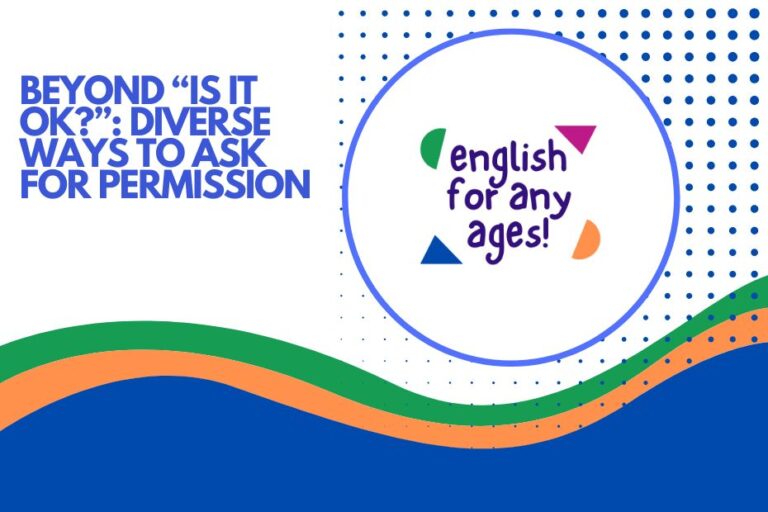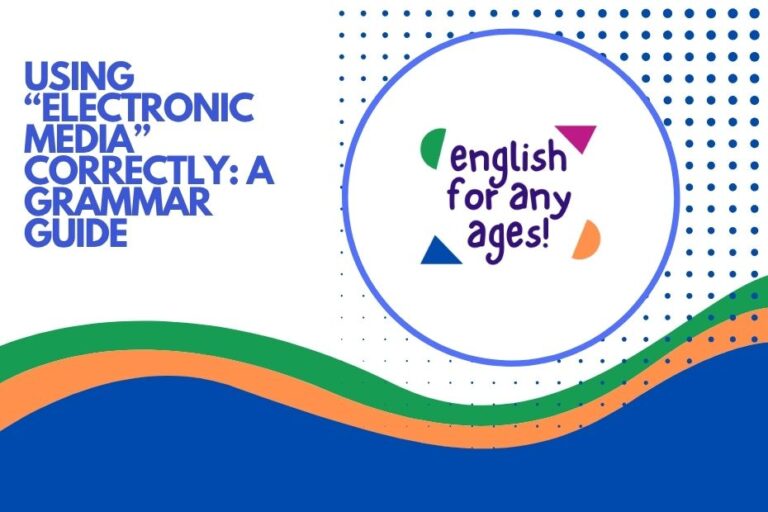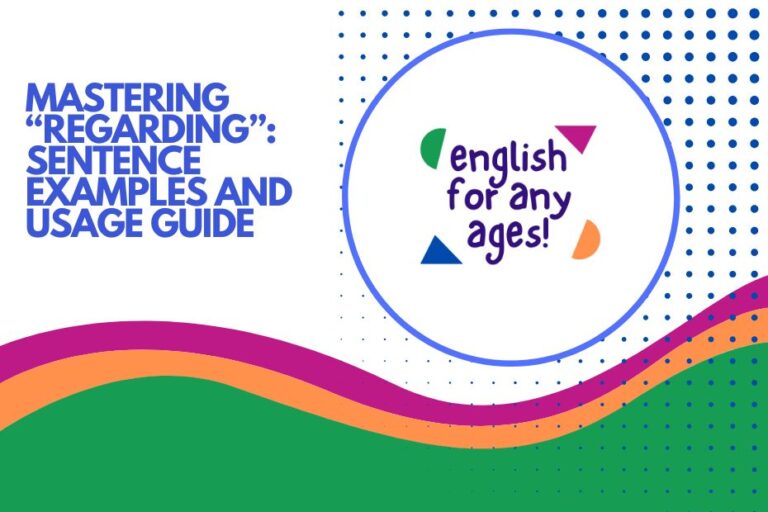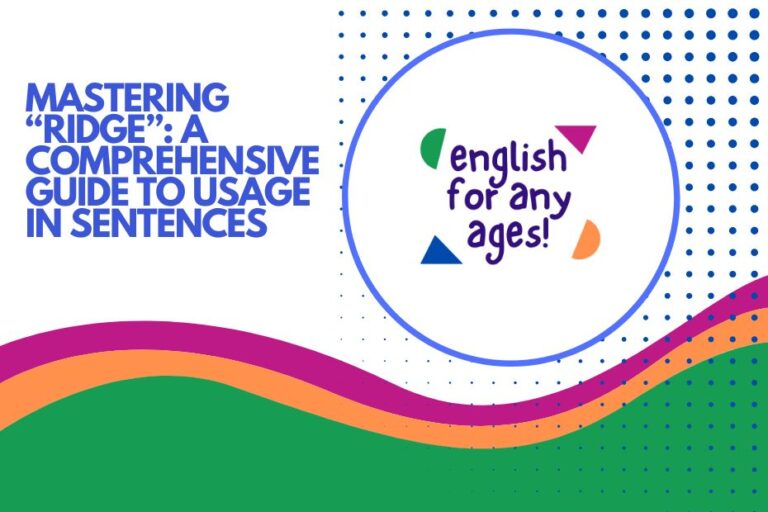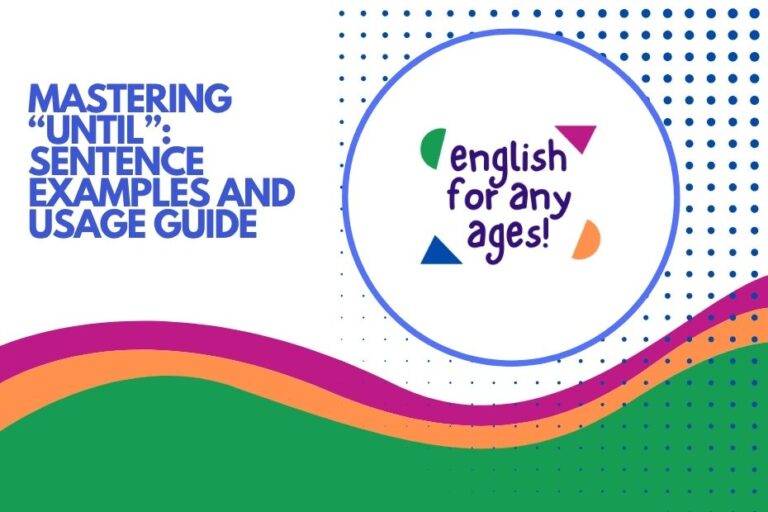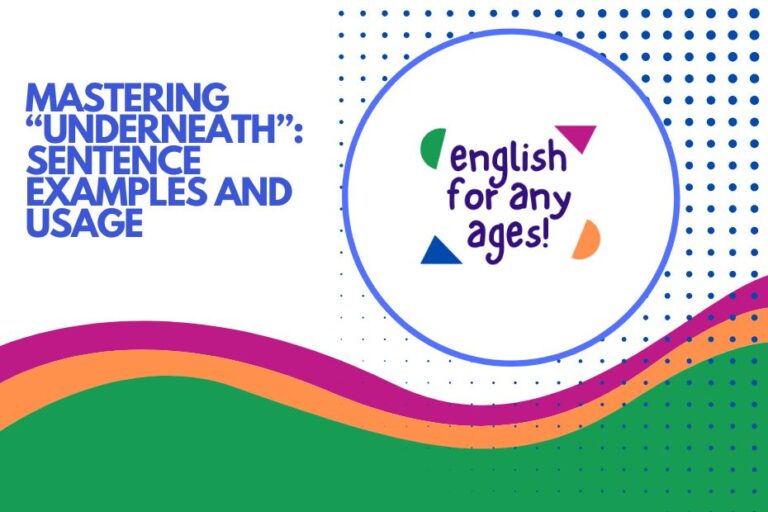Mastering “Before”: Sentence Examples and Usage Guide
The preposition “before” is a fundamental element of English grammar, serving as a cornerstone for expressing time, order, and precedence. A strong grasp of “before” allows for clear and precise communication, enabling you to articulate when events occur in relation to one another.
Whether you’re an English language learner or seeking to refine your grammatical skills, understanding the nuances of “before” is essential for effective and sophisticated writing and speaking. This article provides a comprehensive guide to “before,” complete with definitions, examples, usage rules, and practice exercises to solidify your understanding.
Table of Contents
- Definition of “Before”
- Function of “Before”
- Structural Breakdown
- Types of “Before”
- Examples of “Before” in Sentences
- Usage Rules for “Before”
- Common Mistakes with “Before”
- Practice Exercises
- Advanced Topics
- Frequently Asked Questions (FAQ)
- Conclusion
Definition of “Before”
“Before” is a versatile word in the English language that primarily functions as a preposition, conjunction, and adverb. It is used to indicate a point in time or a position in space that precedes another.
Essentially, “before” signifies something that happens or exists earlier in time or is positioned ahead in a sequence or location. Understanding its different roles is crucial for using it correctly.
Function of “Before”
The primary function of “before” is to establish a relationship of precedence. This precedence can be temporal (relating to time), sequential (relating to order), or spatial (relating to location).
As a preposition, it connects a noun or pronoun to the rest of the sentence, indicating when or where something occurs in relation to that noun or pronoun. As a conjunction, it links two clauses, showing that one event happened prior to the other.
As an adverb, it modifies a verb, adjective, or another adverb, indicating an earlier time or position.
Structural Breakdown
The structure involving “before” depends on its grammatical role. As a preposition, it is followed by a noun phrase (e.g., “before the storm”). As a conjunction, it introduces a subordinate clause that precedes the main clause (e.g., “before the sun sets”). As an adverb, it usually stands alone or modifies a verb phrase (e.g., “I’ve seen it before”). Recognizing these structures is essential for correct sentence construction. Let’s delve deeper into each of these roles.
Types of “Before”
As mentioned, “before” can function as a preposition, a conjunction, or an adverb. Each of these roles carries its own set of grammatical rules and usage patterns.
Before as a Preposition
When used as a preposition, “before” indicates that something is positioned or happens earlier than something else in time, order, or place. It is always followed by a noun, pronoun, or noun phrase.
The prepositional phrase “before + noun phrase” acts as an adverbial modifier, providing information about time, place, or manner.
Example: “He arrived before the meeting.” (time)
Example: “She stood before the judge.” (place)
Example: “Before anything else, let’s get organized.” (order)
Before as a Conjunction
As a conjunction, “before” connects two clauses, indicating that the action in the first clause happens prior to the action in the second clause. The clause introduced by “before” is a subordinate clause, and it can come either before or after the main clause.
When the “before” clause comes first, it is usually followed by a comma.
Example: “Before you leave, please turn off the lights.” (subordinate clause first)
Example: “Please turn off the lights before you leave.” (main clause first)
Before as an Adverb
When used as an adverb, “before” typically refers to a time in the past. It often appears at the end of a sentence or clause and doesn’t require a following noun or clause.
Its meaning is similar to “previously” or “earlier.”
Example: “I have seen that movie before.”
Example: “We had met before, but I didn’t remember him.”
Examples of “Before” in Sentences
To illustrate the different usages of “before,” here are several examples categorized by function.
“Before” Indicating Time
These examples demonstrate how “before” is used to indicate a point in time preceding another.
The following table provides a comprehensive list of sentences using “before” to indicate time. Each example demonstrates a slightly different nuance or context in which the preposition, conjunction, or adverb can be used.
| # | Sentence | Part of Speech |
|---|---|---|
| 1 | I need to finish this report before Friday. | Preposition |
| 2 | She always brushes her teeth before going to bed. | Preposition |
| 3 | Before the concert, we grabbed a quick bite to eat. | Preposition |
| 4 | He had never flown before that trip to Europe. | Adverb |
| 5 | Before I forget, can you remind me to buy milk? | Conjunction |
| 6 | They lived in Paris before moving to Rome. | Preposition |
| 7 | She practiced the song several times before performing it live. | Preposition |
| 8 | Before the rain started, we managed to get inside. | Conjunction |
| 9 | He had never seen such a beautiful sunset before. | Adverb |
| 10 | Before making a decision, it’s important to consider all the options. | Preposition |
| 11 | The package arrived before the estimated delivery date. | Preposition |
| 12 | Before the interview, take some time to relax. | Preposition |
| 13 | I had never experienced such a thing before. | Adverb |
| 14 | Before the deadline, I need to finalize the project. | Preposition |
| 15 | She always checks her email before starting work. | Preposition |
| 16 | Before the movie began, the previews were shown. | Conjunction |
| 17 | I’ve never felt this happy before. | Adverb |
| 18 | Before signing the contract, read it carefully. | Preposition |
| 19 | He had never traveled outside the country before. | Adverb |
| 20 | Before the game, the team warmed up. | Preposition |
| 21 | Before the invention of computers, calculations were done manually. | Preposition |
| 22 | I’ve heard that song before, but I can’t remember where. | Adverb |
| 23 | Before you criticize someone, try to understand their perspective. | Conjunction |
| 24 | She always double-checks her work before submitting it. | Preposition |
| 25 | Before the internet, people relied on libraries for information. | Preposition |
| 26 | I had never seen a shooting star before that night. | Adverb |
| 27 | Before the meeting starts, let’s review the agenda. | Conjunction |
| 28 | He likes to meditate before starting his day. | Preposition |
| 29 | I’ve never tasted such delicious food before. | Adverb |
| 30 | Before buying a house, get a professional inspection. | Preposition |
“Before” Indicating Order or Sequence
These examples illustrate how “before” signifies that one event or action precedes another in a sequence.
The following table provides a list of sentences using “before” to indicate order or sequence. These demonstrate how to use “before” to show the order in which events happen.
| # | Sentence | Part of Speech |
|---|---|---|
| 1 | Always read the instructions before assembling the furniture. | Preposition |
| 2 | Before adding the eggs, whisk the flour and sugar together. | Preposition |
| 3 | He put on his shoes before his coat. | Preposition |
| 4 | Before starting the race, the athletes stretched. | Preposition |
| 5 | She warmed up her voice before singing. | Preposition |
| 6 | Before planting the seeds, prepare the soil. | Preposition |
| 7 | He checked his mirrors before changing lanes. | Preposition |
| 8 | Before submitting your application, double-check all the information. | Preposition |
| 9 | She consulted a doctor before starting the new medication. | Preposition |
| 10 | Before crossing the street, look both ways. | Preposition |
| 11 | Mix the dry ingredients before adding the wet ones. | Preposition |
| 12 | Before you speak, think. | Conjunction |
| 13 | Tighten the screws before using the machine. | Preposition |
| 14 | Before painting the walls, prime them. | Preposition |
| 15 | She prepared her presentation before the meeting. | Preposition |
| 16 | Before taking the exam, review your notes. | Preposition |
| 17 | He always stretches before running. | Preposition |
| 18 | Before answering the question, listen carefully. | Preposition |
| 19 | She outlined her essay before writing it. | Preposition |
| 20 | Before boarding the plane, show your ticket. | Preposition |
| 21 | Before conducting the experiment, gather your materials. | Preposition |
| 22 | She always plans her meals before going grocery shopping. | Preposition |
| 23 | Before you judge someone, walk a mile in their shoes. | Conjunction |
| 24 | He likes to meditate before making important decisions. | Preposition |
| 25 | Before starting a new project, define your goals. | Preposition |
| 26 | She always proofreads her work before submitting it. | Preposition |
| 27 | Before investing money, do your research. | Preposition |
| 28 | He likes to warm up his car before driving in the winter. | Preposition |
| 29 | Before you criticize someone, take a look at yourself. | Conjunction |
| 30 | She always prepares her outfit before going to a party. | Preposition |
“Before” Indicating Location
Although less common, “before” can also indicate physical placement in front of something.
The following table provides a list of sentences using “before” to indicate location. Though less common than its temporal use, “before” can denote physical placement.
| # | Sentence | Part of Speech |
|---|---|---|
| 1 | The defendant stood before the judge. | Preposition |
| 2 | The offering was placed before the altar. | Preposition |
| 3 | He knelt before the king. | Preposition |
| 4 | The protesters gathered before the embassy. | Preposition |
| 5 | She laid her gifts before the shrine. | Preposition |
| 6 | The crowd assembled before the stage. | Preposition |
| 7 | He presented his credentials before the committee. | Preposition |
| 8 | The artist displayed her work before the public. | Preposition |
| 9 | The evidence was presented before the jury. | Preposition |
| 10 | He bowed before the emperor. | Preposition |
| 11 | The witness swore an oath before the court. | Preposition |
| 12 | The children sat quietly before the storyteller. | Preposition |
| 13 | She placed the flowers before the portrait. | Preposition |
| 14 | The soldiers stood at attention before the general. | Preposition |
| 15 | He laid his worries before God. | Preposition |
| 16 | The supplicant kneeled before the idol. | Preposition |
| 17 | The climbers paused before the summit. | Preposition |
| 18 | She stopped before the precipice. | Preposition |
| 19 | The dancers performed before the audience. | Preposition |
| 20 | He stood nervously before the microphone. | Preposition |
“Before” in Figurative Language
“Before” can also be used in figurative language to express abstract or metaphorical concepts.
The following table provides sentences using “before” in figurative language. These examples show how “before” can extend beyond literal meanings to add depth and nuance to expressions.
| # | Sentence | Part of Speech |
|---|---|---|
| 1 | He laid his heart before her. | Preposition |
| 2 | She put duty before pleasure. | Preposition |
| 3 | The company placed profit before people. | Preposition |
| 4 | They set their goals before all else. | Preposition |
| 5 | He held loyalty before everything. | Preposition |
| 6 | She put her career before her family. | Preposition |
| 7 | The politician placed ambition before integrity. | Preposition |
| 8 | He put friendship before personal gain. | Preposition |
| 9 | She considered ethics before efficiency. | Preposition |
| 10 | They valued knowledge before wealth. | Preposition |
| 11 | He placed honesty before popularity. | Preposition |
| 12 | She put safety before adventure. | Preposition |
| 13 | The organization valued sustainability before growth. | Preposition |
| 14 | He set his principles before convenience. | Preposition |
| 15 | She placed her reputation before immediate gratification. | Preposition |
“Before” in Negative Sentences
Using “before” in negative sentences can create a sense of urgency or emphasize the importance of an action.
The following table provides sentences using “before” in negative contexts. These examples show how “before” can be used to express what *didn’t* happen or what *shouldn’t* happen prior to something else.
| # | Sentence | Part of Speech |
|---|---|---|
| 1 | Don’t leave before saying goodbye. | Conjunction |
| 2 | Never judge a book before reading it. | Conjunction |
| 3 | He hadn’t seen her before that day. | Adverb |
| 4 | She had never felt so alone before. | Adverb |
| 5 | Don’t count your chickens before they hatch. | Conjunction |
| 6 | Never assume anything before investigating. | Conjunction |
| 7 | He had never experienced such kindness before. | Adverb |
| 8 | She hadn’t understood the problem before he explained it. | Conjunction |
| 9 | Don’t make a decision before considering all the facts. | Conjunction |
| 10 | Never give up before trying your best. | Conjunction |
| 11 | He hadn’t traveled to Europe before his retirement. | Adverb |
| 12 | She had never encountered such rudeness before. | Adverb |
| 13 | Don’t criticize others before examining yourself. | Conjunction |
| 14 | Never trust someone before earning their trust. | Conjunction |
| 15 | He hadn’t appreciated the value of friendship before that experience. | Adverb |
Usage Rules for “Before”
To use “before” correctly, it’s crucial to understand the specific rules that apply to its function as a preposition, conjunction, and adverb.
Rules for “Before” as a Preposition
- “Before” must be followed by a noun, pronoun, or noun phrase. For example, “before the game,” “before him,” “before leaving.”
- The prepositional phrase acts as an adverbial modifier. It provides information about when, where, or how something happens.
- “Before” can indicate time, order, or location. Pay attention to the context to determine the meaning.
Rules for “Before” as a Conjunction
- “Before” connects two clauses, indicating that one event happens prior to the other.
- The clause introduced by “before” can come before or after the main clause. If it comes first, it is usually followed by a comma. Example: Before you speak, think.
- Ensure the tenses in both clauses are logically related. For example, use the past perfect in the “before” clause if it describes an action completed before another past action.
Rules for “Before” as an Adverb
- “Before” typically refers to a time in the past.
- It usually appears at the end of a sentence or clause.
- It does not require a following noun or clause.
Common Mistakes with “Before”
Even experienced English speakers sometimes make mistakes with “before.” Here are some common errors and how to avoid them.
| Incorrect | Correct | Explanation |
|---|---|---|
| Before to leave, I will say goodbye. | Before leaving, I will say goodbye. | “Before” as a preposition should be followed by a gerund (leaving), not an infinitive (to leave). |
| I saw him before, that he arrived. | I saw him before he arrived. | “Before” should connect two clauses directly when used as a conjunction. |
| Before, I have never been there. | I have never been there before. | As an adverb, “before” usually appears at the end of the clause. |
| Before I will go, I finish my work. | Before I go, I will finish my work. | Do not use “will” in the ‘before’ clause when ‘before’ is used as a conjunction to indicate time. |
| He did that before, but now he doesn’t. | He did that before, but he doesn’t now. | While understandble, the pronoun is recommended to keep the sentence clear. |
Practice Exercises
Test your understanding of “before” with these exercises.
Exercise 1: Fill in the Blanks
Fill in the blanks with the correct form of “before.”
| # | Sentence | Answer |
|---|---|---|
| 1 | I need to leave ____ the meeting starts. | before |
| 2 | Have you seen this movie ____? | before |
| 3 | ____ eating, wash your hands. | Before |
| 4 | She arrived ____ everyone else. | before |
| 5 | ____ you make a decision, think carefully. | Before |
| 6 | He had never experienced anything like that ____. | before |
| 7 | ____ the storm, the sky was clear. | Before |
| 8 | She always stretches ____ running. | before |
| 9 | ____ I forget, can you remind me to call him? | Before |
| 10 | He stood ____ the crowd. | before |
Exercise 2: Sentence Correction
Correct the following sentences that contain errors in the use of “before.”
| # | Incorrect Sentence | Correct Sentence |
|---|---|---|
| 1 | Before to go, I need to pack my bags. | Before going, I need to pack my bags. |
| 2 | I saw her before, that she left. | I saw her before she left. |
| 3 | Before, I never ate sushi. | I had never eaten sushi before. |
| 4 | Before he will arrive, we should prepare everything. | Before he arrives, we should prepare everything. |
| 5 | Don’t speak before you think it. | Don’t speak before you think. |
| 6 | Before to start, let’s review the plan. | Before starting, let’s review the plan. |
| 7 | I met him before, that was a long time ago. | I met him before; that was a long time ago. |
| 8 | Before, she had never been so happy. | She had never been so happy before. |
| 9 | Before to sign the contract, read it carefully. | Before signing the contract, read it carefully. |
| 10 | I ate before, I’m not hungry now. | I ate before, so I’m not hungry now. |
Exercise 3: Sentence Combining
Combine the following pairs of sentences using “before.”
| # | Sentences | Combined Sentence |
|---|---|---|
| 1 | He left the house. The sun rose. | He left the house before the sun rose. |
| 2 | She finished her work. She went to bed. | She finished her work before she went to bed. |
| 3 | They ate dinner. They watched a movie. | They ate dinner before they watched a movie. |
| 4 | He studied hard. He took the exam. | He studied hard before he took the exam. |
| 5 | She practiced the song. She performed it live. | She practiced the song before she performed it live. |
| 6 | The rain started. We got inside. | We got inside before the rain started. |
| 7 | He made a decision. He considered all the options. | He considered all the options before he made a decision. |
| 8 | She started work. She checked her email. | She checked her email before she started work. |
| 9 | The movie began. The previews were shown. | The previews were shown before the movie began. |
| 10 | He signed the contract. He read it carefully. | He read the contract carefully before he signed it. |
Advanced Topics
For advanced learners, here are some more complex aspects of using “before.”
Formal vs. Informal Usage
In formal writing, it’s important to maintain clarity and avoid ambiguity when using “before.” In informal speech, some of the rules may be relaxed. For instance, it’s acceptable to omit the subject pronoun in the “before” clause in very casual conversation, but this should be avoided in formal writing.
“Before” in Idioms and Expressions
“Before” appears in several common idioms and expressions, such as:
- Think before you leap: Consider the consequences before taking action.
- Before long: Soon.
- Never seen the likes of someone/something before: To have never encountered anything similar.
Frequently Asked Questions (FAQ)
Here are some frequently asked questions about using “before.”
- Can “before” be used at the beginning of a sentence?
Yes, “before” can be used at the beginning of a sentence when it functions as a conjunction introducing a subordinate clause. In this case, the subordinate clause is usually followed by a comma before the main clause. For example: “Before you leave, please remember to lock the door.” - What is the difference between “before” and “ago”?
“Before” indicates a point in time relative to another event, while “ago” refers to a specific duration in the past from the present moment. For example: “I saw him before the meeting” (relative time), and “I saw him three days ago” (specific duration). - Is it correct to say “before to go”?
No, it is not correct. When “before” is followed by a verb, the verb should be in the gerund form (-ing). The correct phrase is “before going.” - Can “before” be used to describe events in the future?
Yes, “before” can be used to describe events in the future, but it is important to use the correct tense. For example: “Before you go on vacation, make sure you pack your bags.” The “before” clause uses the present tense to refer to a future event. - How do I know if “before” is a preposition or a conjunction?
If “before” is followed by a noun, pronoun, or noun phrase, it is a preposition. If “before” is followed by a clause (a subject and a verb), it is a conjunction. - What tense should I use in the clause following “before”?
The tense in the clause following “before”

